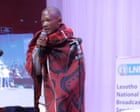
The past few days have witnessed a range of impactful events around the globe, each carrying weighty implications for the communities involved. From sensitive political issues in Lesotho to critical healthcare discussions in Sydney, not to mention significant developments within the United States and Mexico, these stories collectively reflect the dynamic and often challenging landscape of our current global context.
In Lesotho, a quiet plea for employment opportunities has turned into a pivotal moment highlighting both the societal demand for economic reform and the tensions that can arise when such calls challenge the status quo. Tšolo Thakeli, a committed activist dedicated to addressing youth unemployment, was unexpectedly arrested following his video post questioning Prime Minister Sam Maketane’s commitments to job creation. The arrest underscores the delicate balance between advocacy and governance, sparking conversations about freedom of expression and the critical importance of employment for Lesotho’s youth.
Meanwhile, in Sinaloa, Mexico, the ongoing challenges posed by cartel violence have reached distressing new heights. The recent discovery of 20 bodies amid a surge in violence between factions of the Sinaloa cartel calls attention to the persistent struggles faced by law enforcement and civilians alike. As the government endeavors to curb these violent outbreaks, the affected communities continue to seek safety and stability, underscoring the urgent need for effective interventions and peace-building efforts.
In Sydney, Australia, a different kind of concern is taking shape, centered on health and well-being. Staff at the Royal Prince Alfred Hospital have issued warnings about the potential repercussions of reducing midwifery staff, including serious risks to maternal and infant safety. As staffing cuts begin impacting one of the city’s major hospitals, the conversation about health care resource allocation increases in intensity, highlighting the intricate balance between fiscal policies and the provision of essential health services.
Back in the UK, Bristol Crown Court has been engaged with a deeply troubling case involving the tragic story of a two-week-old boy, Brendon Staddon, who suffered catastrophic injuries. As details unfold, the case poses poignant questions regarding the safety and welfare of children, the responsibilities of care, and the critical nature of timely and attentive medical intervention.
Lastly, in the sphere of international development, a significant policy shift has stirred critical responses from global figures. The closure of the US Agency for International Development (USAID) has sparked remarks from former Presidents Barack Obama and George W. Bush, who have openly criticized the move. Their joint statement, also supported by notable activist Bono, warns of the potential for millions of avoidable deaths as a consequence of this decision. This debate highlights the continuing discourse on the role of international aid in fostering global health and development, emphasizing the interconnectedness of nations in addressing humanitarian challenges.
These narratives, collected from across continents, showcase a world deeply intertwined through its challenges and responses. They serve as a reminder of the powerful impacts of advocacy, policy, and community resilience. In reflecting on these stories, one is encouraged to remain hopeful and engaged, recognizing that through mindful discourse and collaborative efforts, progress is always within reach.
Source: {link}
